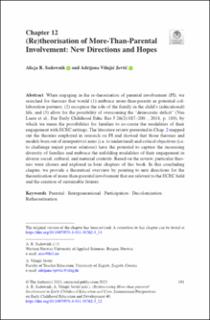(Re)theorisation of More-Than-Parental Involvement: New Directions and Hopes
Chapter, Peer reviewed
Published version
Permanent lenke
https://hdl.handle.net/11250/3121220Utgivelsesdato
2023Metadata
Vis full innførselSamlinger
Originalversjon
https://doi.org/10.1007/978-3-031-38762-3_12Sammendrag
When engaging in the re-theorisation of parental involvement (PI), we searched for theories that would (1) embrace more-than-parents as potential collaboration partners, (2) recognise the role of the family in the child’s (educational) life, and (3) allow for the possibility of overcoming the “democratic deficit” (Van Laere et al., Eur Early Childhood Educ Res J 26(2):187–200. , 2018, p. 189), by which we mean the possibilities for families to co-create the modalities of their engagement with ECEC settings. The literature review presented in Chap. 2 mapped out the theories employed in research on PI and showed that those theories and models born out of interpretivist aims (i.e. to understand) and critical objectives (i.e. to challenge unjust power relations) have the potential to capture the increasing diversity of families and embrace the unfolding modalities of their engagement in diverse social, cultural, and material contexts. Based on the review, particular theories were chosen and explored in later chapters of this book. In this concluding chapter, we provide a theoretical overview by pointing to new directions for the theocratisation of more-than-parental involvement that are relevant to the ECEC field and the creation of sustainable futures.

